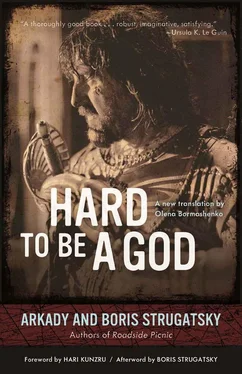He bumped into something hard and sharp with his chest. A black-robed horseman was in front of him. A long spear with a broad, carefully serrated blade was resting against Rumata’s torso. The horseman was silently looking at him from the dark recesses of his hood. The only thing visible under the hood was a thin-lipped mouth with a small chin. I have to do something, thought Rumata. But what? Knock him off his horse? No. The horseman started slowly drawing back the spear to strike. Oh, yes! Rumata listlessly raised his left hand and pulled back his sleeve, showing the iron bracelet he was given when he left the palace. The horseman looked closer, raised his spear, and rode past. “In the name of the Lord,” he said in a muffled voice with a strange accent.
“In His name,” Rumata muttered and kept going, walking past another horseman, who was trying to use his spear to reach an expertly carved wooden figure of a merry imp sticking out below the eaves of the roof. A horror-stricken fat face flickered behind the partially torn off shutter on the second floor—this must have been one of the shopkeepers who only three days ago were rapturously shouting “Hurray for Don Reba” over their beer and listening to the thump, thump, thump of the hobnailed boots on the pavement with delight. Oh, the grayness, the grayness… Rumata turned away.
And how are things at home? he suddenly wondered. He quickened his pace, almost running the entire last block. The house was still standing. Two monks were sitting on the front steps; they had thrown their hoods back and were showing their carelessly shaved heads to the sun. They stood up when they saw him. “In the name of the Lord,” they said in unison.
“In His name,” responded Rumata. “What is your business here?”
The monks bowed, crossing their arms on their stomachs. “You’re here, so we’re leaving,” one of them said. They walked down the steps and slowly plodded away, hunching and stuffing their hands into their sleeves. Rumata followed them with his eyes and remembered the thousands of times he had seen these meek figures in long black robes in the streets. Only before, they didn’t have the scabbards of extremely heavy swords dragging behind them in the dust. We messed up, oh, how we messed up! he thought. It had been quite the sport for the noble dons—sidling up to a monk who was plodding alone, and telling each other naughty stories over his head. And I, the idiot, would pretend to be drunk and trail behind them, roaring with laughter, and was so happy that the empire was at least not prone to religious fanaticism. But what could we have done? Yes, what could we have done?
“Who’s there?” a quavering voice asked.
“Open up, Muga, it’s me,” Rumata said softly.
The bars rattled, the door cracked open, and Rumata squeezed into the entrance hall. Everything here was as usual, and Rumata gave a sigh of relief. Old, gray-haired Muga, nodding his head, reached for Rumata’s helmet and swords with his usual deference.
“How’s Kira?” Rumata asked.
“Kira’s upstairs,” said Muga. “She fine.”
“Excellent,” Rumata said, stepping out of his sword slings. “And where’s Uno? Why isn’t he greeting me?”
Muga took the sword. “Uno was killed,” he said calmly. “He lies in the servants’ quarters.”
Rumata closed his eyes. “Uno was killed…” he repeated. “Who killed him?”
Without waiting for an answer, he went into the servants’ quarters. Uno was lying on the table, a sheet covering him up to his waist; his arms were folded across his chest, his eyes were wide open, and his mouth was twisted in a grimace. Downcast servants were standing around the table and listening to a monk mumbling in the corner. The cook was sobbing. Rumata, not taking his eyes off the boy’s face, started unbuttoning the collar of his waistcoat with clumsy fingers.
“Bastards,” he said. “Everyone is such a bastard!”
He tottered, came closer to the table, looked into the dead eyes, lifted the sheet, and immediately put it back down.
“Yes, it’s too late,” he said. “Too late… It’s hopeless. Oh, those bastards! Who killed him? The monks?”
He turned toward the monk, yanked him up and bent over his face.
“Who killed him?” he demanded. “Was it you? Tell me!”
“It wasn’t the monks,” Muga said quietly behind his back. “It was the gray soldiers.”
Rumata spent a while longer peering into the monk’s thin face, into his slowly expanding pupils. “In the name of the Lord…” wheezed the monk. Rumata let him go, sat down on the bench at Uno’s feet, and started to cry. He cried, covering his face with his hands, and listened to Muga’s quavering, indifferent voice. Muga was telling him how after the second night watch, someone knocked on the door in the name of the king, and Uno shouted not to let them in, but then they did have to let them in, because the grays were threatening to burn down the house. They burst into the hall, beat up the servants and tied them up, and then started climbing the stairs. Uno, who was standing by the entrance to his chambers, started firing his crossbows. He had two crossbows, and he managed to fire twice, but he missed once. The gray soldiers threw their knives, and Uno fell. They dragged him downstairs and started trampling him with their feet and beating him with their axes, but then the black monks entered the house. They hacked the two gray soldiers to death and disarmed the rest, put nooses around their necks, and dragged them out onto the street.
Muga’s voice fell silent, but Rumata kept sitting there for a long time, resting his elbows on the table at Uno’s feet. Then he rose heavily, wiped off the tears stuck in his two-day stubble with his sleeve, kissed the boy’s icy forehead, and, barely able to move his legs, plodded upstairs.
He was half-dead from shock and exhaustion. After somehow managing to clamber up the stairs, he walked through the living room, made his way to the bed, and with a moan, collapsed facedown into the pillows. Kira came running. Rumata was so worn out that he didn’t even help her undress him. She pulled off his boots, then, crying over his swollen face, tore off his tattered coat and metalstrom shirt, then cried some more over his battered body. Only now did he feel that all his bones hurt, like after high-gravity training. Kira was rubbing him down with a vinegar-soaked sponge and he, without opening his eyes, hissed through closed lips and muttered, “And I could have killed him… I was right next to him… Could have squashed him with two fingers… Is this life, Kira? Let’s leave this place… This Experiment is on me, not on them.” He didn’t even notice that he spoke Russian. Kira kept looking at him fearfully, with eyes that were glassy from tears, and only silently kissed his cheeks. Then she covered him with threadbare sheets—Uno never did manage to buy new ones—and ran downstairs to make him some mulled wine. He crawled out of bed and, groaning from the all-consuming pain, shuffled barefoot into his study, opened a secret drawer in his desk, rummaged in the first-aid kit, and took a few sporamin pills. When Kira came back with a steaming teapot on a heavy silver tray, he was lying on his back and listening to the pain receding, the noise quieting down in his head, and his body filling with renewed strength and vigor. After finishing the teapot, he felt completely well, called Muga, and ordered him to prepare his clothes.
“Don’t go, Rumata,” Kira said. “Don’t go. Stay home.”
“I have to, little one.”
“I’m scared. Please stay. They’ll kill you.”
“Now, now. Why in the world would they kill me? They are all afraid of me.”
She began to weep again. She was weeping quietly, timidly, as if she was afraid he’d be angry. Rumata sat her down on his knees and started stroking her hair.
Читать дальше












